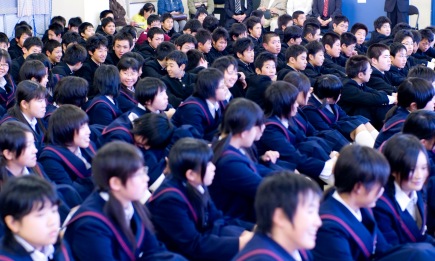Universities desperate in aging Japan

What happens to a country if it grows old? This is a majorquestion for policymakers all over Europe. By 2050, it is estimatedthat the median European citizen will be 52,3 years old by 2050. InJapan, a similar trend can be observed. Within the last 20 years,the number of Japanese 18 year olds decreased from 2 million tocurrently around 1,2 million.
Lowering standards to counter agingpopulation
Beyond worries about rising costs of pension funds and thehealth care system, this has had major consequences for the highereducation sector as the Japan Times
Universities struggle to keep enrolment numbers high as tuitionfee paying students are essential to their funding. Especiallyamong medium and low level institutions this has led to asignificant decline in entrance requirements Kotaro Takahashi fromthe Japanese Education and Science Ministry lamented. Universitieswould simply lower their standards by either completely abandoningselection schemes or limiting the scope of entrance tests.
When Mars and sun orbits the Earth
An interesting side note in this context is an experiment anAstronomy professor of Tokai University conducted. Last year,Mitsumi Fujishita tested 667 students in his undergraduate courseasking questions like “Which of the following – the sun, the moonor Mars – orbits the Earth?” To his disbelief 46% of the quizparticipants answered either sun or Mars. To the question: “towhich direction does the sun set?” 22% answered “east”.
“Japan’s current educational environment is one in which highschool students who don’t study can enter universities, anduniversity students who don’t study can graduate. This is a globalrarity,” commented Toshihiro Kawamoto, who has repeatedly talked inJapanese media about this issue.
International talent to fill empty lecturehalls
Simply accepting fewer students into universities would nothelp, nevertheless. “For example, decreasing the number of medicalstudents will result in a shortage of doctors. Similarly,decreasing the number of university students will result in ashortage of skilled people. We should expand and educate studentsinstead of scaling things down.”
Some observers believe that another way out would be to simplyattract more highly talented foreign students. In 2010, 140.000international students attended Japanese universities. Thegovernment aims to more than double this rate to 300.000 by2025.
Meest Gelezen
Wederom intimidatie van journalisten door universiteit, nu in Delft
‘Burgerschapsonderwijs moet ook verplicht worden in hbo en wo’
Extra geld voor bètafaculteiten is daar nooit terechtgekomen
Raad van State: laat taaltoets nog niet gelden voor hbo-opleidingen
Vrouwen houden universiteit draaiende, maar krijgen daarvoor geen waardering

